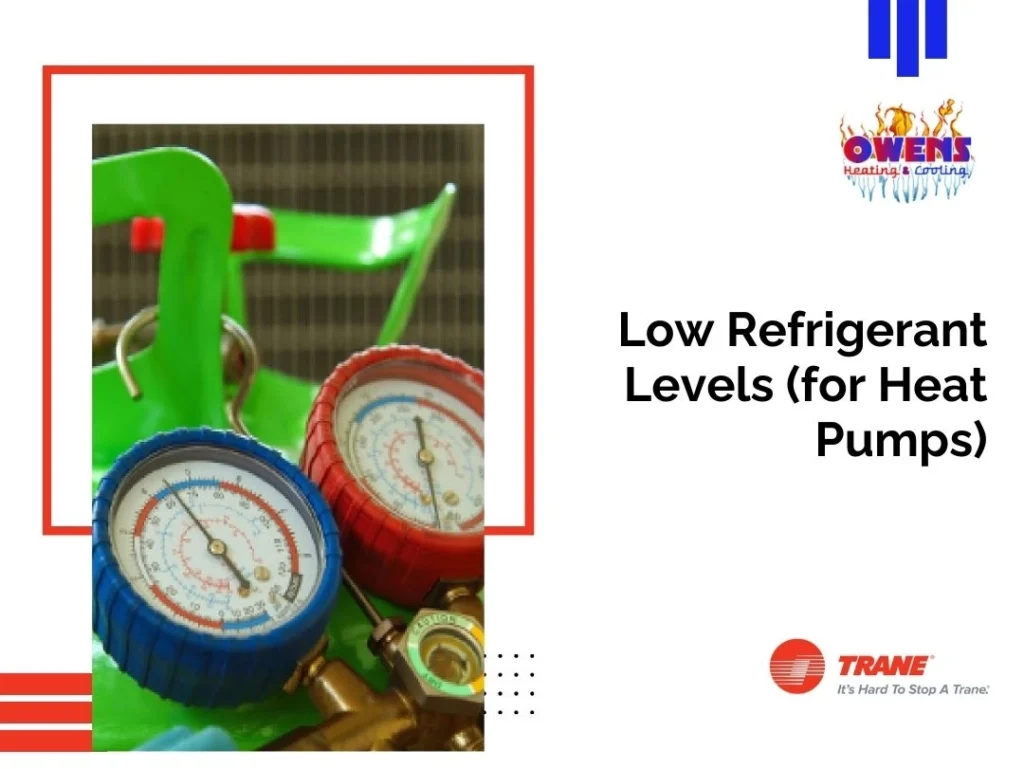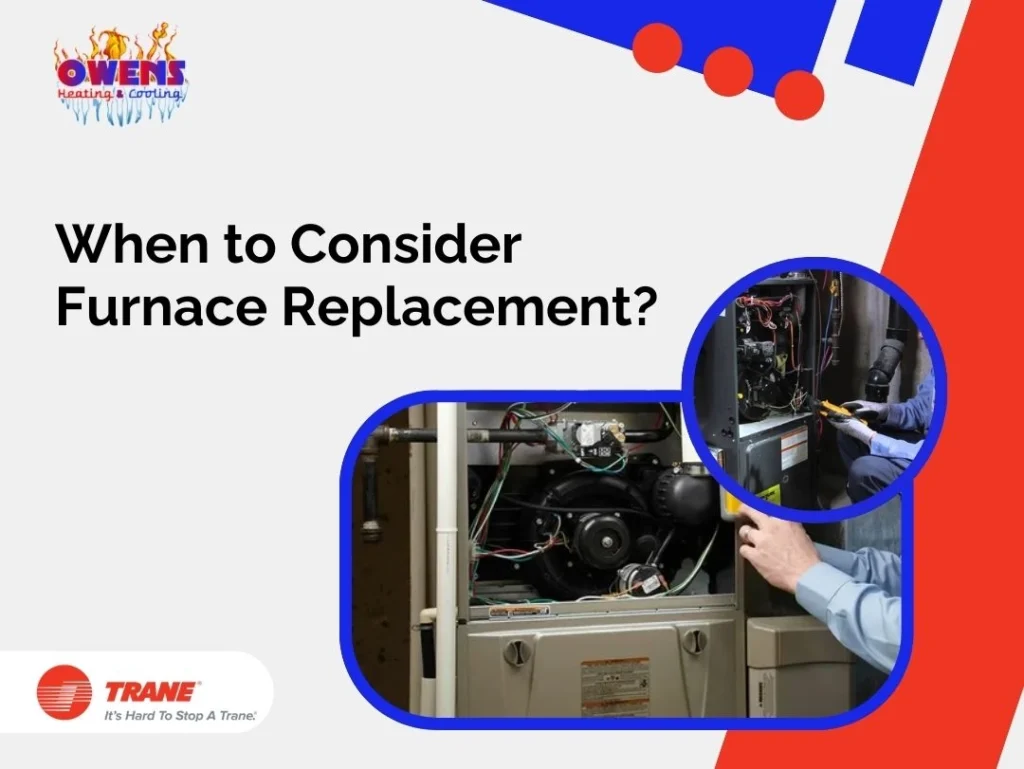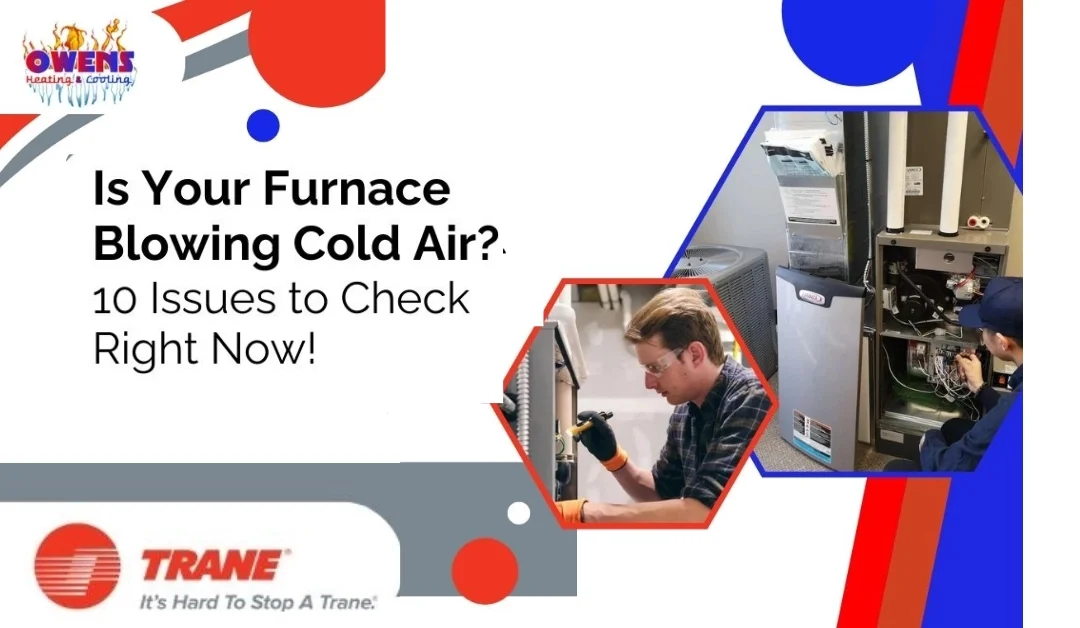Winter is here in Boone, IA, and with temperatures dropping, you rely heavily on your furnace to keep your home warm and comfortable. But what happens when your furnace starts blowing cold air instead of delivering the cozy warmth you expect? It’s a frustrating issue that can leave your home feeling like an icebox, especially when the weather outside is harsh.
We know that winter here can be unpredictable and harsh, with temperatures frequently dipping below freezing. A malfunctioning furnace in this kind of weather isn’t just inconvenient—it can be a serious issue, potentially leading to frozen pipes and unbearable living conditions. Let’s dive into five common reasons why your furnace might be blowing cold air and how you can address these problems—or when it’s best to call a reliable furnace repair service in Boone, IA.
1. Thermostat Settings Issues
Your thermostat is like the command center for your HVAC system, making sure everything runs smoothly. If it’s not set correctly, you might end up with chilly air blowing through your vents.
One common issue is a thermostat that has inadvertently been switched to “cool” instead of “heat.” It sounds simple, but it could happen if someone accidentally bumps the dial or if it was programmed incorrectly. Take a moment to check the settings on your thermostat. If it’s a digital model, ensure the mode is set to “heat,” and if it’s an older manual version, make sure it’s positioned at a temperature above the current room temperature.
How to Fix It!
Check that your thermostat is set to “heat.” For best results, set it to “auto” instead of “fan,” as “auto” allows warm air to circulate only when needed. If the thermostat is outdated, upgrading to a programmable or smart thermostat can enhance control and reliability. If this doesn’t resolve the issue, consult a furnace repair service in Boone, IAto ensure your thermostat is calibrated correctly.
2. Dirty or Clogged Air Filters
Explanation of Issue
Over time, air filters can become dirty or clogged with dust, debris, and other particles. When this happens, the airflow becomes restricted, which can strain your HVAC system and lead to uneven temperatures. This is a common cause of cold air blowing instead of the warm air you expect, as the system struggles to maintain consistent heating.
How to Fix It!
Make it a habit to check and replace your air filters regularly to prevent this issue. For most homes, replacing filters every one to three months is recommended, especially during peak seasons. Clean air filters improve airflow, enhance efficiency, and help your HVAC system provide consistent warm air throughout your home. If your system continues to struggle, it may be time to consult an HVAC company for a thorough inspection.
3. Pilot Light or Ignition Problems (Gas Furnaces)
Explanation of Issue
If you have a gas furnace and notice that it’s blowing cold air, a problem with the pilot light or ignition system could be the cause. A malfunctioning pilot light means your furnace cannot ignite the gas needed to produce heat. Common reasons for pilot light issues include drafts, a dirty or blocked sensor, or worn-out components.
How to Fix It!
First, check if the pilot light is lit. If it’s off, attempt to relight it following the manufacturer’s guidelines. Be cautious and make sure you’re following safety guidelines to stay safe. If your pilot light frequently goes out or won’t stay lit, it’s best to call an HVAC contractor in Boone, IA, for professional help. They can safely assess the problem and repair or replace any damaged components, so your HVAC system can work reliably again.
4. Ductwork Leaks or Poor Insulation
Explanation of Issue
Another common reason for your furnace blowing cold air in winter could be issues with your home’s ductwork. If there are leaks or insulation problems, warm air can escape before it even reaches your living space. This is particularly common in older homes where ductwork may be worn or damaged.
How to Fix It!
Inspect your ductwork for visible leaks or damage. Minor leaks can sometimes be sealed with HVAC tape, but a professional inspection is often necessary for more extensive repairs. An experienced HVAC company can ensure your ductwork is well-sealed and insulated, preventing heat loss and improving your system’s efficiency. Proper ductwork can also reduce the load on your HVAC system, extending its lifespan and reducing the need for costly furnace replacement down the line.
5. Low Refrigerant Levels (for Heat Pumps)

Explanation of Issue
If you’re using a heat pump and notice it’s blowing cold air, low refrigerant levels could be the culprit. The refrigerant is crucial for absorbing and transferring heat in the system. Without enough refrigerant, the heat pump cannot properly warm the air, leading to chilly air circulation even when you need warmth.
How to Fix It!
Refrigerant problems should always be addressed by a professional! Low refrigerant often indicates a leak, which needs to be located and repaired before recharging the system. A furnace repair service in Boone, IA,can check refrigerant levels, repair any leaks, and recharge your system to restore optimal performance. Keeping refrigerant at the correct level is essential for a fully functional HVAC system, particularly in cold winter months.
6. Clogged Air Intake or Exhaust Vent
Explanation of Issue
Clean air intake and exhaust vents are essential for furnace operation. When these vents become blocked—often by debris, snow, or ice—the furnace can struggle to maintain adequate airflow, causing it to blow cold air.
How to Fix It!
Check both intake and exhaust vents for blockages and clear any obstructions, especially during winter. Regularly maintaining these vents will help your furnace run smoothly. If the problem persists, it may require a technician’s expertise to inspect and clean the internal airflow pathways.
7. Blower Motor Problems
Explanation of Issue
The blower motor is essential for circulating warm air throughout your home, delivering heat to each room. When this motor starts to malfunction or fails altogether, it can cause your furnace to blow only cold air, affecting your overall comfort and energy efficiency. Over time, blower motors may wear out due to regular use or lack of maintenance, which can cause strain on the furnace system, leading to inefficient heating or unexpected shutdowns.
How to Fix It!
Listen for unusual sounds from the blower motor, which can indicate a problem. Cleaning or replacing dirty air filters can help if the blower is struggling. However, if the issue persists, a trained technician can diagnose and replace the blower motor if necessary.
8. Dirty Burners
Explanation of Issue
In gas furnaces, the burners are responsible for igniting and producing heat. When these burners accumulate dirt, dust, or debris, it can obstruct the gas flow and prevent the burners from igniting efficiently. Dirty burners not only lead to the furnace blowing cold airbut can also cause the system to shut down as a safety measure. This buildup often happens over time, especially if regular maintenance is neglected, and can compromise your furnace’s heating performance.
How to Fix It!
Turn off the furnace and check the burners. Lightly clean any debris or buildup, but avoid contact with sensitive components. If you’re unsure about cleaning them yourself, a furnace repair technician can perform a thorough cleaning to ensure proper ignition.
9. Heat Exchanger Issues
Explanation of Issue
The heat exchanger is a critical part of your furnace that warms the air circulating through your home. It transfers heat from the furnace’s combustion chamber to the air blowing through the ducts. When the heat exchanger is cracked or damaged, your furnace may shut down as a safety measure, or it may blow only cold air. Damaged heat exchangers can also lead to carbon monoxide leaks, which pose serious health risks, making it essential to address any issues immediately.
How to Fix It!
Heat exchanger problems are serious and should be handled by a professional. If you suspect a crack, turn off the furnace and contact a furnace repair service immediately. A technician can inspect the heat exchanger and recommend necessary repairs or replacements for safe operation.
10. Furnace Limit Switch Malfunction
Explanation of Issue
The limit switch is a safety feature that prevents overheating by shutting off the heating elements when the furnace gets too hot. If the switch malfunctions, it may blow only cold air as a protective measure.
How to Fix It!
Start by checking if your furnace is overheating, which might cause the limit switch to activate. Clean or replace dirty filters to maintain airflow. If the switch itself is faulty, it’s best to call a technician who can replace the part, allowing your furnace to heat properly again.
Preventive Tips for Consistent Warm Air During Winter
Regular maintenance is key to preventing the frustration of cold air blowing in the winter. Here are a few proactive steps:
- Schedule Routine HVAC Maintenance:Annual inspections, particularly before winter, can identify potential issues early and prevent breakdowns.
- Replace Air Filters Frequently:Clean filters ensure proper airflow and heating efficiency.
- Adjust Thermostat Settings Seasonally:Set your thermostat correctly to avoid unnecessary circulation of cold air.
- Inspect Ductwork Regularly:Checking for leaks or insulation issues can help retain warmth and reduce energy waste.
These preventive measures can help you avoid common furnace issues and keep your home comfortable throughout winter.
When to Consider Furnace Replacement?

If your furnace system frequently blows cold air, even after addressing these common issues, it may be time to considerFurnace replacement.Older systems lose efficiency and can become increasingly costly to repair. An HVAC company can assess your system’s condition and recommend whether replacement might be a more reliable and cost-effective option in the long term. Investing in a new furnace system provides improved energy efficiency, greater comfort, and fewer unexpected repairs.
Conclusion
There’s nothing more inconvenient than an HVAC system blowing cold air in winter. By understanding the most common causes—like thermostat issues, dirty filters, pilot light problems, ductwork leaks, and low refrigerant—you can quickly identify and address the problem. Some solutions are easy to handle yourself, while others may require the expertise of an HVAC company to ensure safe and effective repairs.
If your HVAC issues persist, don’t hesitate to reach out to a trusted HVAC contractor in Boone, IA. Their expertise can help diagnose and fix the problem, keeping your home warm and comfortable all season. Remember, regular maintenance is the best way to avoid unexpected issues and extend the life of your HVAC system.
For residents facing more persistent issues, this winter could be the perfect time to consider an HVAC replacement, especially if your system is outdated or frequently malfunctioning. Ensuring your HVAC system is in good shape not only brings comfort but also improves energy efficiency and reliability, giving you peace of mind during the cold months.

